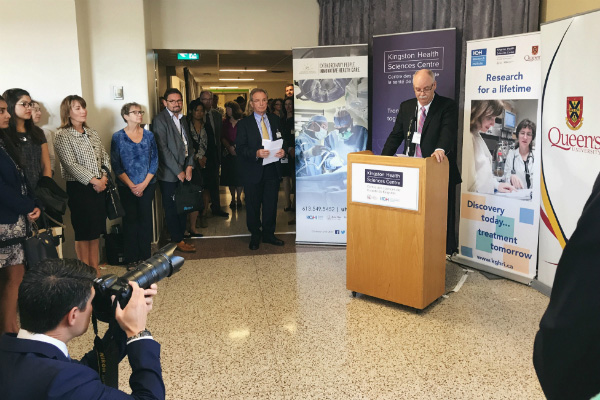New era of health research in Kingston
September 11, 2017
Share

Home to one of the country’s top 40 research hospitals and a world-renowned university, Kingston has long been recognized as an important centre for health research in Canada.
That reputation is reaching new heights with the opening of the W.J. Henderson Centre for Patient-Oriented Research. The new centre positions Kingston Health Sciences Centre (KHSC), Queen’s University and the KGH Research Institute (KGHRI) as international leaders in partnering with patients to improve health knowledge and outcomes.
The state-of-the-art centre brings together for the first time the facilities, equipment and research projects that require direct patient involvement into a single space. Located within KHSC’s Kingston General Hospital site and adjacent to the Queen’s University campus, the facility is situated to give clinician-scientists, researchers, and research volunteers a safe and accessible environment where patients can be consulted, assessed and monitored as they take part in research studies.
“This centre is the realization of our commitment to patient-oriented research,” says Dr. Roger Deeley, Vice-President of Health Sciences Research at KHSC and Vice-Dean of Research, Faculty of Health Sciences, Queen’s University. “It expands opportunities for patients to take part in the discovery process, and it provides a stimulating environment for collaboration. This will lead to innovation, better treatments and improved outcomes for patients and their families. It also provides the ideal environment for multi-disciplinary approaches to research and a solid training ground for future clinician-scientists and researchers.”
At 10,000 square feet, the centre increases research space at the KGH site by 25 per cent. Facilities include shared research labs and work spaces, patient examination and procedure rooms, comfortable waiting areas for patients and their families, a biohazard Level 2 preparation area, as well as the capability to conduct early stage clinical trials, crucial steps in the development of new drug and device treatments and therapies.
“Research has become an increasingly collaborative pursuit that not only requires clinician-scientists from partner institutions to work more closely together, but also for researchers and patients to become more deeply involved in the discovery process,” says Dr. John Fisher, Vice-Principal (Research) at Queen’s University. “This new centre will strengthen the collective efforts of Kingston’s world-class scientific community and ultimately provide patients with improved healthcare and quality of life.”
"This represents a significant milestone in health research at KHSC. The centre will become a major hub for clinical research as we further integrate research between Queen's and our academic hospital partners,” says Dr. Richard Reznick, Dean of the Faculty of Health Sciences at Queen’s University. “Ultimately, the work of the centre will translate into improved patient outcomes in our community and will help us to both educate future scientists and recruit leading researchers from around the world.”
Constructed at a cost of $4.2 million, the centre’s creation was made possible through generous gifts from more than 150 donors, including $1 million from the W.J. Henderson Foundation and $1.2 million in funding from the Canada Foundation for Innovation, awarded to Dr. Stephen Vanner, (Gastrointestinal Diseases Research Unit) and Dr. Douglas Munoz (Centre for Neuroscience Studies).
“This facility reflects a significant commitment by individuals and organizations, including the Canada Foundation for Innovation, the Ontario Ministry of Research, Innovation and Science, clinician-scientists and researchers, and donors including the W.J. Henderson Foundation. Their support made this centre possible, and we are profoundly grateful to them,” says Dr. Deeley.
For more information on the W.J. Henderson Centre for Patient Oriented Research, visit www.kgh.on.ca/research.